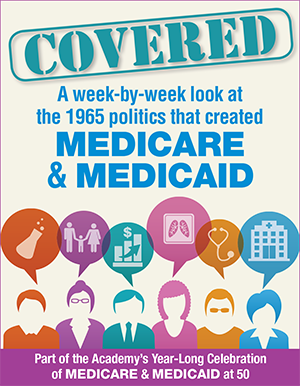Bob Rosenblatt, Special Correspondent
Throughout 2015, the Academy is working with partners to create a platform for dialogue around the history and future of these two vital programs, including this weekly Covered blog series. Covered is written by Bob Rosenblatt, a Senior Fellow at the National Academy of Social Insurance and editor of the website HelpWithAging. Learn more about the Academy’s celebration of the 50th anniversary of Medicare and Medicaid.
Doc Says Medicare Bill Unfair to Mentally Ill
May 22, 1965
By Bob Rosenblatt, Special Correspondent
Washington, DC – The health care legislation offering hospital benefits for people over the age of 65 won’t pay for treatment in mental hospitals, Pennsylvania’s Commissioner of Mental Health, William Camp, MD, told a Senate Finance Committee hearing on May 17. This is a case of “severe discrimination,” he said.
The Senate Finance Committee is hearing of late from a number of stakeholder groups who seek to expand the proposed program’s coverage. The proposed law, called Medicare, would create a new benefit under the Social Security system, providing up to 60 days of care in a hospital during a spell of illness. The inpatient benefit, which would be funded through payroll taxes paid by workers and their employers, provides coverage to all persons over the age of 65. But the bill as drafted specifically excludes coverage for patients in mental hospitals.
The only coverage for care in mental hospitals would be available under a voluntary insurance program, called Part B, which would cost $6 a month, with $3 paid by the individual and $3 by the federal government. Mental hospital benefits would be available to those who enrolled in the voluntary insurance program if the facilities have been approved by the Joint Commission on Accreditation of Hospitals.
This policy could make access to mental health benefits difficult for many older people.
There are about 275 public mental hospitals with about 500,000 beds, according to Dr. Camp. Only 85 of those facilities with a total of just over 200,000 beds are accredited by the Joint Commission on Accreditation of Hospitals.
Drafters of the House legislation did not offer a reason for this limitation in coverage, either in the committee report or in debate on the House floor, according to Camp, the Pennsylvania Commissioner of Mental Health. Speaking on behalf of directors of state programs for the mentally ill to members of the Senate Finance Committee, Dr. Camp sought to remove the provision of the bill that excludes “any institution which is for the care and treatment of mental diseases” from coverage under Part A of the Medicare program.
There was no explanation from the Ways and Means Committee or the Johnson Administration about the decision to exclude mental hospitals from Part A of the program. But Sen. Eugene McCarthy (D-MN), suggested two possible reasons: the cost of caring for people who may be in mental hospitals for indefinite stays, and “the fact … that 27 states do not have an accredited mental hospital.”
Patients over age 65 in mental hospitals are not likely to have long, costly stays, according to Camp. “It is not true – despite long-held notions – that the mentally ill aged cannot be quickly returned to family and community,” Camp said. “They can.” Camp explained further: “It is not true that in our State mental hospitals today a newly admitted elderly person is most likely to spend the rest of his life in that hospital. It is a fact that when the dollars and personnel are available and the aged mentally ill are submitted to intensive treatment they respond in almost the same proportions as persons of other ages.”
Many of the patients over 65 in mental hospitals aren’t actually mentally ill, Camp said. “Frequently, they are persons who need medical attention, but not necessarily in a mental hospital. These persons can be treated or cared for in specialized geriatric facilities.”
In statement, Albert Glass, MD, Director of the Oklahoma Department of Mental Health, told the Senate panel, doctors can send these patients home within three months if they do the work of addressing malnutrition, anemia, cardiac decompensation, diabetes, cataracts and other diseases related to aging are treated and stabilized.
The lack of mental health benefits under Part A is the negative element in a piece of legislation that is otherwise welcomed by the mental health community, Camp said. He cited the inclusion of mental hospitals benefits as part of the Kerr-Mills Act that provides funds to states to pay for the health care bills of poor people over the age of 65. This landmark provision was included in the bill after “an often lonely fight” by two Senators, Democrat Russell Long (D-LA) and Republican House Frank Carlson (R-KA), who “have proven to be genuine friends of sufferers from mental illness,” Camp told the committee.
Despite appeal of Camp and others, the Senate is unlikely to significantly expand the bill. But if the Medicare proposal does becomes law, it will create universal access to hospital care for those over the age of 65 and that will be critical for many seniors who are now in mental hospitals because they can’t afford coverage elsewhere for age-related ailments. Many of these patients may be able to transfer to regular, accredited hospitals where the new Medicare coverage would pay their bills.
► Directory of COVERED posts
► Read the next post in the COVERED series, “Private Insurance Plans Will Run New Federal Health Program for Seniors”
► Learn more about the Academy’s celebration of the 50th anniversary of the enactment of Medicare and Medicaid

